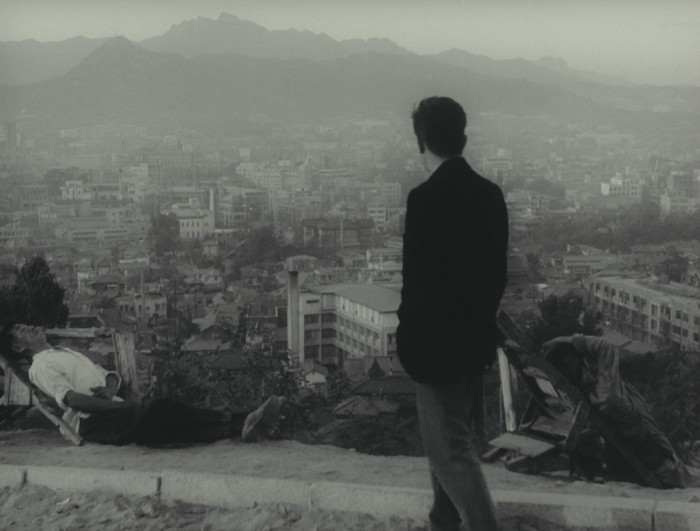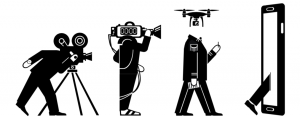Dear J,
I was glad to run into you at Delphi Filmpalast (a magnificent theater) on the second to last night of Berlinale. Knowing you and your passion for cinema to the extent that I do, I wasn’t totally surprised but amazed nonetheless that you had watched close to 40 films, with one day left to go, during your first ever Berlinale. I ran into you three times during the festival and each time I could tell just how stoked you were to be here and that you wanted to make the most out of every second by seeing as much as you could.
On my first trip to Berlinale 13 years ago, I had only seen 14 films, most of which are covered in this report for Senses of Cinema, one of my first published works of film criticism. Re-reading this report today, I’m surprised I had seen so few films on my first trip; this year I watched 20, which still didn’t feel like a sufficient number. (I think the most I’ve ever seen was was in 2009, when I reviewed 30 films [part 1/part 2/part 3] for Mubi, back when it was called The Auteurs). Despite how relatively few films I saw in 2004, reading that report makes it clear that it was my favorite experience of Berlinale and will probably always be. This year was, at least until the last day or so, my least fulfilling experience, one that had me wondering what festivals mean to me at this point.
I really envy that younger version of myself in that 2004 report who threw himself fully into the experience and came away with so many rich encounters with films and filmmakers alike. With all the cultural negotiations and re-contextualizations that took place over each film discussion, it becomes clear that the social experience of analyzing movies, as reflected in my first festival coverage, was as meaningful for me as watching the films. So perhaps this first report was an unintentional blueprint for the kind of filmmaking I’ve engaged in since.

This social experience of film analysis also informed my main participation in this year’s Berlinale as a mentor in the Talent Press for young critics (which I would recommend that you apply to next year if you’re looking for a way to subsidize your trip, though I doubt you’d be able to watch as many films as you did this year due to the time commitments of the program). This is my third year mentoring in this program and I appreciate how it allows me to have engaged, one-on-one conversations about the craft of film criticism with talented young critics from around the world (this year’s participants came from Chile, Egypt, India, Nigeria, The Philippines, Slovenia, Turkey, and the U.K.). I’m especially excited in helping to develop a video and social media arm to the program, since that’s where I see the future of film criticism heading and I want to help establish some standards of quality for these modes.
I realize that I’ve come full circle from when I first attended Berlinale as a Talent myself in 2004. Back then I participated as a “director” (based on a couple short films I had made at the time), and yet I still ended up spending most of my time watching films. Publishing that Senses of Cinema report was the most significant thing I got from my participation in the Talents program. In other words, I entered as a filmmaker and left as a critic.
13 years and eight Berlinale visits later, I feel pulled in the reverse direction, asking myself what it means to be attending Berlinale for the first time while living in Berlin, serving in a residency program meant to provide me a coveted opportunity to focus on the kind of work I really want to do. The scope of the Farocki residency can certainly encompass film criticism and festivals; Farocki was no stranger to either. Over his career Farocki occupied so many moving image practices, from radical collective filmmaking to criticism to television to festivals to galleries, his work evolving with the prevailing practices of film as art and political expression alike. His career arc provides a vivid case study for any young filmmaker figuring out how to navigate their way through the contemporary mediascape.
This was the main point I wanted to get across in a brief presentation I gave to Talents on a visit to the Farocki Institut office in silent green during the festival. It’s also a point I keep trying to impress upon myself as I keep trying to fulfill this notion of being a “filmmaker.” Ever since my first Berlinale, I’d use film viewing as a justification for researching and getting inspiration to make my own films, but in a very real sense it’s also been a form of compulsive procrastination. I say this with some irony, as this procrastination allowed me to be a very productive film critic capable of covering dozens of films at each Berlinale. But these days I find this tendency to be unsatisfying and counterproductive to an evolving set of goals I have in relation to how I want to function in the world these days.

I was only able to articulate a fuller sense of this condition on the second to last day of the festival, with the 14th film I saw, Aimless Bullet. This 1961 film is considered a canonical work of South Korean cinema, and it was the first time I had ever seen it. I must confess that I stumbled into the screening somewhat half-wittingly since it fit in my schedule, and upon learning that it was an old film, I had the impulse to leave since I could always catch up with it later on video. (I had already persuaded a friend to ditch a film from the festival’s Moroccan retrospective when I found it on YouTube). I have to remark on this, what we might call an “eject button” mentality, and how it reveals a perverse anxiety, a resistance, even a resentment towards films, in assessing their worth as an investment of one’s time. Even an established classic is not worth my time, in this case precisely because it is an established classic that can be seen elsewhere, so I’m better off watching something I can’t readily see.
Nonetheless I stayed with Aimless Bullet to the end, despite having to make a mental adjustment at the beginning to its 1950s theatrical modes of acting and rather patriarchal scenario (again, impatient for something directly applicable to what I’m working on these days), and was rewarded with one of the most devastating last acts any film has delivered. By this point we’ve seen a man gradually fail at all the social roles he’s asked to perform (husband, father, brother, son, office worker, ex-soldier) and he’s left dazed in the back of a cab, stuck between several possible places he can go to perform any one of those roles, but knowing he will do so as badly as he ever has. Pressed by the cabbie for a destination, he can only say, “Just go… just go… just go…”
This line of dialogue is perhaps the most lucid expression of what it means to live in modernity that I’ve heard in any film. As long as you keep going, you are a productive member of society, at least as long as that expended energy can fit into what society wants. This film ruthlessly picks that logic apart, exposing an underlying social instability that was already difficult for the Cold War generation to navigate in Korea back in 1961 and that somehow informs my experience of Berlinale in 2017. Something that I’d call “hypercontingency” – this feeling of being lost amidst so many options for what to care about, while always feeling that something is missing and that there’s always something not being seen, while having accumulated enough experience over the years to know that roughly 80% of these films will fall from memory into relative insignificance. A natural but nonetheless alienating question emerges: what does all this movie watching amount to? In some ways it’s a version of the same question posed by contemporary globalism and digital existence, where exposure to an unprecendented and exponentially growing set of options leads to a crisis of values – who am I really? Is it really fulfilling to care about so many things? What do I really care about and want? It’s an inversion of the utopian openness expressed in my first report. Being a kid in a candy store has 13 years later led to a stomach ache.
This wasn’t intended to be a cautionary response to your 40 film Berlinale experience, or any sort of advice, because I’m not sure I have any. It’s really more of a personal self-assessment for where I am and what significance that kind of relation to movie watching and festivals means to me now. It’s not that I’ve been turned off from festivals entirely. But perhaps it’s no surprise that my favorite films at Berlinale were are the ones that articulate this sense of being disoriented in a world full of elusive promises often leading to tragic disappointments. They are among the ones marked with a * in this list of films I watched at the Berlinale, in the order in which I watched them.
The Foolish Bird (Huang Ji and Otsuka Ryuji)
* El mar la mar (J.P. Sniadecki and Joshua Bonnetta)
Ulrike’s Brain (Bruce LaBruce)
Somniloquies (Verena Paravel and Lucien Castaing Taylor)
Requiem for Mrs. J (Bojan Vuletić)
The Lost City of Z (James Gray)
The Young Karl Marx (Raoul Peck)
Beuys (Andres Veiel)
* On the Beach at Night Alone (Hong Sang-soo)
* Have a Nice Day (Liu Jian)
Tania Libre (Lynn Hershman Leeson)
* Logan (James Mangold)
2+2=22 [The Alphabet] (Heinz Emigholz)
* Aimless Bullet (Yu Hyun-mok)
In a Year of Non-Events (Ann Carolin Renninger and René Frölke)
* Golden Exits (Alex Ross Perry)
City of the Sun (Rati Oneli)
* Streetscapes [Dialogue] (Heinz Emigholz)
* Investigating Paradise (Merzak Allouache)
* Spell Reel (Filipa César)
Again, good to see you in Berlinale, and here’s to your future festival goings, wherever they may take you.
Kevin
